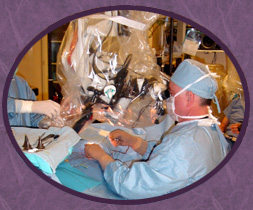
 |
 |
 |
 |
Drooling
Children and adults with neuromuscular disorders frequently have drooling as a significant additional issue. It is annoying to the patient and caregiver . It interferes with communication devices, causes local oral-dental problems, and is a barrier to interpersonal relationship building. It is not uncommon for people to avoid those who drool. Many children who drool do not learn full speech because people are reluctant to hold a conversation with them.
Drugs for drooling have many systemic side effects and have not been very effective. The combinations of drugs used often interact with other required medication making drug treatment difficult and undesirable.
There is another solution. In the last nine years, nearly 100 children from 2.5 to 14 years of age have undergone a middle ear surgical procedure to control drooling, transtympanic neurectomy and chorda tympanotomy.
Performed as outpatient surgery, transtympanic neurectomy and chorda tympanotomy has resulted in a very substantial reduction of drooling in over 77% of those so treated as judged by sustained long term control. Many have had drooling completely eliminated.
Transtympanic neurectomy with chorda tympanotomy surgery is performed with the operating microscope and with the present modifications is unique to this program. Children who have persistant middle ear problems such as otitis media or previous middle ear surgery are not excluded. While procedures with similar titles have been performed for many years in other venues, the modifications used in this method are important to this particular group of patients and are responsible for the improved outcomes.
Preoperative exam by the operating otolaryngologist (ENT) is necessary. However, the fine tuning of the procedure has allowed that postoperative visits are seldom required. Nearly all the minimal postoperative needs can be handled by the patient's pediatrician.
The effects are nearly immediate in children. In adults, due to pooling within hypertrophied glands, the full effect takes two to three months to level out as the long-standing glandular tissue overgrowth (bloating) resolves.

- (908) 277 - 3875
- or sfreifeld@sf-md.com
Querries to :
Stephen Freifeld, MD
454 Morris Avenue
Springfield, New Jersey, 07081